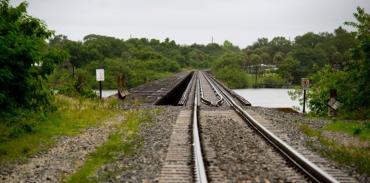
Folks along the Florida East Coast rail corridor, a highly populated, congested route with more than 300 at-grade crossings it will share with All Aboard Florida’s (AAF) 110 mph passenger trains, apparently will also see FEC move liquefied natural gas (LNG) along the same route. This, according to documents obtained through a Freedom of Information Act request by Martin and Indian River Counties, along with Citizens Against Rail Expansion in Florida (CARE FL).
If FEC realizes its plans, it will become only the second railroad in the country to transport liquefied natural gas as a commodity by rail.
Specifically, the FRA states the following regarding Alaska Railroad (ARR), the only railroad now transporting LNG: “The FRA views ARR’s approval as different from a potential FEC approval, due to the significant differences between the two states and the areas through which they would be transporting the product. For example, if ARR transports LNG it will be doing so at 40 mph through mostly unpopulated areas with few highway-rail grade crossings, whereas under FEC’s proposal, trains transporting LNG will pass through highly populated areas, with more frequent crossings, while sharing tracks with passenger trains traveling at 110 mph.”
Said Ruth Holmes, senior assistant Martin County attorney, “The FRA clearly recognizes the inherent danger of fast moving freight trains transporting a volatile substance like LNG passing passenger trains traveling up to 110 mph through our densely populated communities. While the FRA claims it will conduct a thorough evaluation of the safety risks, we believe a thorough review of the environmental impacts is also needed."
The letter further reveals FEC has had ongoing discussions with the Railroad Administration related to the transportation of LNG along the corridor since September 2014. However, no mention of this was included in either the September 2014 Draft Environmental Impact Statement or the August 2015 Final Environmental Impact Statement, even though the proposal is directly related to, and clearly impacts, the AAF project.
“Once again we have discovered that FEC and AAF are shielding information from the communities they are directly affecting. Transporting a hazardous material like LNG is a major safety risk for our communities and must be thoroughly reviewed and evaluated from every angle,” said Dylan Reingold, Indian River County attorney.
“The AAF project itself poses a great enough risk to Treasure Coast communities and it is now clear that they intend to increase that risk exponentially by adding an extremely dangerous substance to the mix. Running 110 mph trains and LNG over the same tracks is simply a recipe for disaster,” Brent Hanlon, chairman of CARE FL, said in the Monday statement.
Coming on the heels of the news that AAF derailed a passenger train but never publicly disclosed it, the non-public nature of this LNG letter has left Treasure Coast citizens in particular with even less reason to trust their safety to AAF and FEC.


